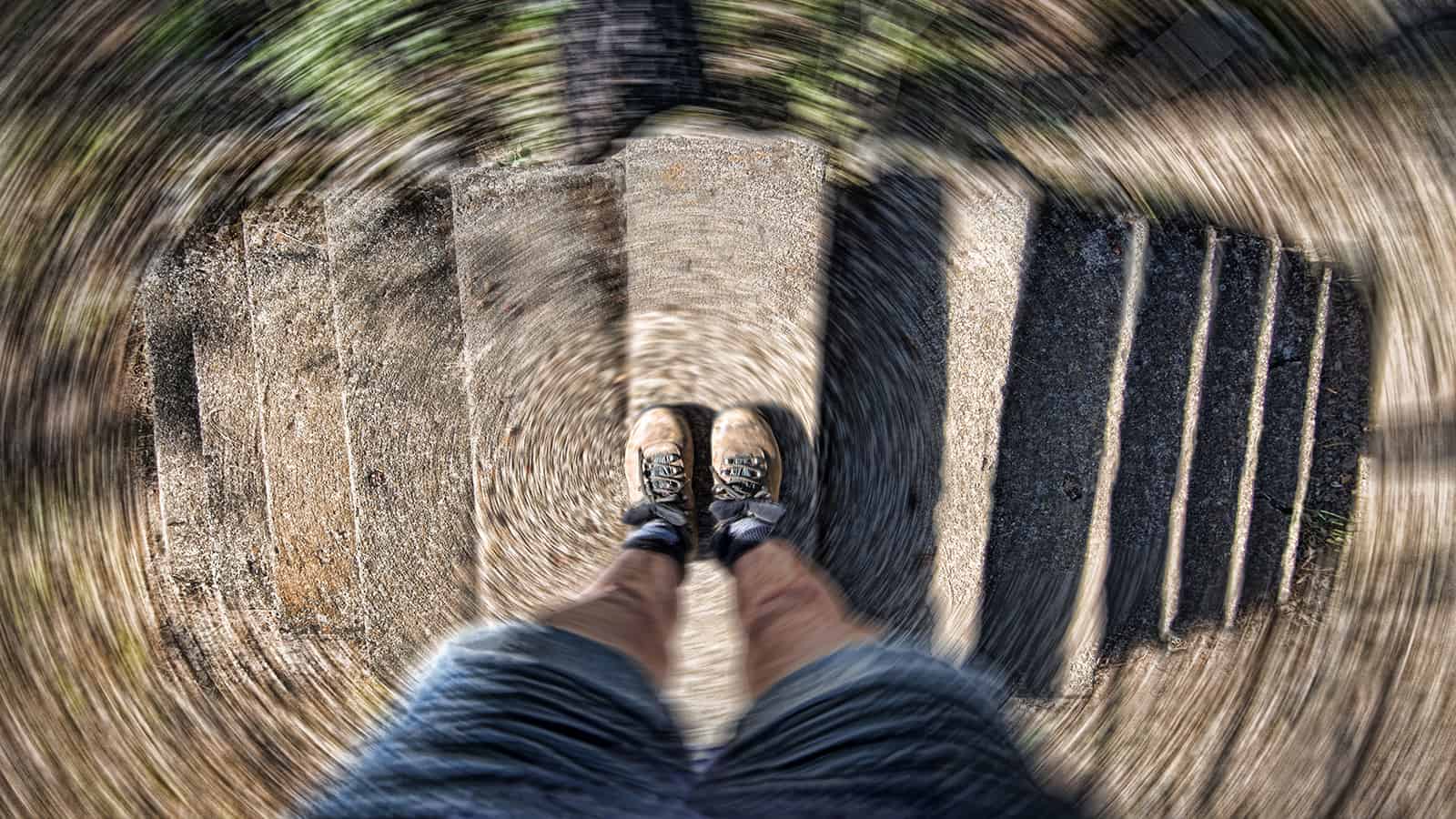Dizzy spells can hit you at any moment. For most people, it seems to hit at the worst possible time. They’re extremely disorienting and can take you a while to recover from them.
Despite the discomfort of dizzy spells, they’re often harmless. At least, that was the general consensus among scientists and doctors. However, new research is challenging this consensus. Researchers from the University of California, San Diego has found evidence that dizzy spells could increase a person’s risk of developing dementia.
Before diving into the details of the study, it helps if you’re familiar with what causes dizzy spells. The next section will give you some background information on them.
A Brief Look at Coping with Dizzy Spells
Dizziness often hits you suddenly and unexpectedly and can be alarming as you try to figure out why it happened. Occasional dizziness is usually not a cause for concern. However, if the dizziness recurs or lasts longer than a few seconds, it’s an indicator of a more serious problem.Causes of Dizziness
Dizziness is often described in many ways. The most common description is that people feel as if the room is moving or spinning. Other definitions are: a floating sensation, feeling unbalanced or unsteady, feeling faint, or feeling heavy-headed.
There are many causes of dizziness and it can be hard for a doctor to pinpoint the cause without a full work up. Dizziness isn’t usually the problem itself – it’s usually a symptom of something else. Therefore the cause is usually some underlying condition. One of the causes – the cause that the study references – is low blood pressure (hypotension).
Hypotension
Like dizziness, low blood pressure can be caused by a number of problems. However, that’s a discussion for another article. What’s important is the type of low blood pressure mentioned in the study. It references a certain type of low blood pressure known as orthostatic hypotension (OHYPO). It’s also sometimes called postural hypotension.
OHYPO can be broken down into systolic OHYPO or diastolic OHYPO. Systolic OHYPO occurs when the systolic measurement of blood pressure drops 20 mm Hg or more within three minutes of standing from the sitting or supine position. Naturally, diastolic OHYPO is when this happens to the diastolic measurement of blood pressure, except the threshold is 10 mm Hg or more.
Orthostatic hypotension occurs when your blood vessels don’t constrict as you change to an upright position. The body usually constricts your blood vessels temporarily to prevent gravity from pulling all your blood downward as you sit or stand. If the blood vessels don’t narrow, your oxygen supply to your brain is temporarily interrupted, which results in a dizzy spell.
This can happen to anyone, and as long as it passes quickly it’s usually not a cause for concern. However, recurrent issues can indicate that something is wrong and, as the study proves, recurrent issues can cause long-term problems.
Details of the Study
The study was lead by Dr. Laure Rouch, PharmD, PhD. Other researchers involved in the study were Jean-Sébastien Vidal, MD, PhD, Tina Hoang, MPH, Philippe Cestac, PharmD, PhD, Olivier Hanon, MD, PhD and Kristine Yaffe, MD. The study was published in Neurology, a journal from the American Academy of Neurology (AAN).
The purpose of the study was to determine if chronic low blood pressure was a risk factor for dementia later in life. There were 2,131 older adults that participated in the study. They didn’t have dementia at the beginning of the study. The average age was 73 years old and the group consisted of mixed demographics.
The Procedure
Researchers took frequent measurements of participants’ blood pressure over a course of five years. This included keeping up with their systolic and diastolic measurements. To start, 309 participants had OHYPO, 192 had systolic OHYPO, and 132 people had diastolic OHYPO.
Several adjustments had to be made for outside factors. Some of these included demographics, antihypertensive drugs, smoking and alcohol use, and body mass index. One major adjustment was for the presence of one or two APOE ε4 alleles. According to scientists, the presence of this allele is a high risk factor for developing Alzheimer’s disease – the most common form of dementia.
The Results
By the end of the study, 462 of the participants had developed dementia (21.7%). After the adjustments, the results of the study showed that systolic OHYPO was associated with a greater risk of developing dementia. Diastolic OHYPO and OHYPO was not. There was also an association found in people who’s systolic blood pressure varied from postural changes.
What the Results Mean for the Future
It’s important to keep in mind that these results are preliminary. The research must be replicated and further analyzed before the theory is set in stone. However, this outcome shines a light on an area that could possibly be a link to a cause of dementia. It’s a welcomed theory since dementia pathology is so limited.
In addition to this, keeping blood pressure under control is important anyway since chronic blood pressure problems can lead to other problems. This study simply adds more importance to keeping people’s blood pressure at the recommended levels.
Information About Having Dizzy Spells and the Vestibular System
Both dizziness and hypotension are two conditions that may not get as much attention as they should. When these two conditions occur, whether together or individually, many people often push them off since they only last for a short amount of time. Even doctors may disregard these symptoms as minor issues.
The truth is that, when studied as a whole, dizziness and hypotension are a part of a bigger picture and the number of people that deal with these conditions are surprising. They are part of an epidemiology that is composed of:
- Dizziness
- Vertigo
- Unsteadiness
- Migraines
- Hyper- and hypotension
- Agoraphobia
- Motion sickness susceptibility (MSS)
- Anxiety
- Depression
- Vaso-vagal episodes (VVE)
Researchers and doctors find that these issues usually occur in a combination of at least two or three of them rather than individually. It has also been found that more women that men suffer from these issues in combination.
When studying these conditions together, they are liked as being vestibular problems. This means that it’s a condition of the inner ear, which is where the human body gets its’ balance from. However, vestibular functions are often linked to certain cognitive functions such as memory and emotions.
Based on this, it should be no surprise that blood pressure problems are showing a correlation with cognitive disorders. Exploring the this correlation can lead to a major advance in solving vestibular issues in addition to dementia.
Signs That You Have Vestibular Problems
In addition to chronic dizzy spells, there may be other signs that let you know you have problems with your vestibular system. Identifying these signs is important so you can address the issues before they get bad; you don’t want to wait until you’re facing dementia to figure out that vestibular issues was the problem all along.
The medical term for vestibular dysfunction is vestibular balance disorder. Dizzy spells and vertigo, especially when paired together, are the main signs. However, according to John Hopkins Medicine, other signs are:
- Blurred vision
- Stumbling or falling down; losing your balance
- Feeling disoriented
- Anxiety
- Fear
- Diarrhea
- Changes in the rhythm of your heart
- Vomiting
The last five signs are less common, but if you experience them along with the first three, this is a strong indicator of the disorder.
What’s interesting about vestibular balance disorder, blood pressure problems, and even dementia is the intricate ways in which they are all linked. The vestibular system (your ears) is composed of sensitive canals filled with fluid. This fluid is what tells your body when you’re balanced or not. It’s similar to a level that you would use in construction or home design.
Blood pressure issues stem from intricate blood vessels having problems and dementia stems from intricate brain cells that have problems. Essentially, they are all blood flow problems which points to one big shared factor – low oxygen levels. The body is incredibly assiduous in it’s attempt to fix this problem. It seems it will shut down every system in an effort to get you to do what it wants.
Final Thoughts on Dizzy Spells
Everyone has dizzy spells once in a blue moon. Most of the time they’re nothing to worry about. They’ll last a few second, you’ll get over it, and you’ll move on.
However, if they persist then it’s time to do something about them. As the study indicates, this can lead to much worse problems like dementia. You can fix dizzy spells; you can’t fix dementia. Therefore you should see a doctor about your dizziness right away.
The hope is that the results of this study will provide a path to a future solution for dementia. If dizziness is one of the causes, that’s an easier fix than dementia itself. At the very least, it could diminish the number of people that develop the incurable cognitive disease. Science continues to give mankind hope and the study from the researchers at the University of California, San Diego is a perfect example of the advancements that we are making.
















 Community
Community

